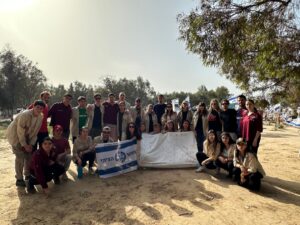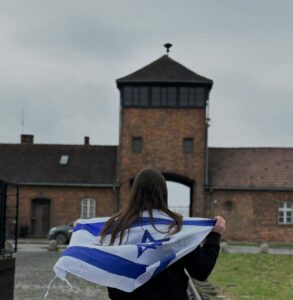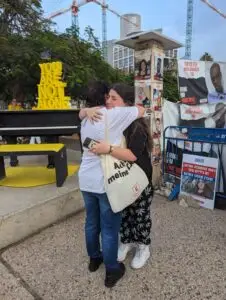During the last weeks I have had an exchange of ideas with one of the members of the Hakhshara group of the Movement who is in Israel today. Our dialog was about current ideological subjects and the subject of this title is one of them. Since the matter is of general interest, I have decided to write something, clearly and methodically, I hope, in order to explain my position about this issue.
Firstly, I would like to express my great satisfaction about the fact that young people, haverim in Hanoar Hazioni, today as yesterday, express their critical and clear opinion, regarding subjects which some would consider “sacred cows”. That fact gives strength to my position as a person educated in the movement, a movement which thought me to doubt and to check any opinion which I might consider neither coherent nor straight, since today young people practice that same right to express their critical views.
Secondly, the discussion compels me to review my convictions and to examine whether my convictions are true today. I believe that we don’t have to explain nor revise our Zionist conviction. The Zionism has been and still is today the Movement of renovation of the Jewish People, which mission is to bring the majority of the People to return to Israel, to renew language and Jewish culture, to rebuild national independence and sovereignty and to place our people in the world as equals to the nations of the globe from a legal point of view and at the frontline with its culture and its cultural message, living securely in its own homeland.
If we proceed to revise these basic assumptions, we will see clearly that we are still very far from the achievement of our goals:
Most of the People are still outside Eretz Israel, under an ever tangible danger of cultural annihilation.
Israeli society, even though it has renewed Hebrew as a language in an extremely successful manner, has not yet achieved the renewal of the national Culture in such a way to make it a common wealth.
We have achieved our constantly threatened sovereignty at the expense of a lot of blood, living thanks to our own military strength, strong and courageous, but we have not achieved yet the absolute security for our people, nor the recognition of all the countries on Earth.
We have accomplished outstanding achievements which place us at the leading edge among the nations in the fields of Agriculture, conquest of the desert, Medicine and Cybernetics, but we have neglected the social factor in such a way that this is placing us at the rear, in the last rows of the world scenario.
And finally, we have not carried out the promise of General Roca who around 1890 said that “to govern is to settle”: most of the country, of which the NEGEV represents more than 50 percent, is yet to be settled; Ben Gurion’s vision and the reality which existed more than a thousand years ago, has not been accomplished yet.
That is, from the point of view of Zionism, I believe that we will not have any difficulty in agreeing that its mission has not ended yet and that there is still a lot to be done.
Now, let’s look at the Kibbutz.
This human undertaking began its journey when Eretz Israel had almost nothing: no considerable Jewish population, no agriculture or industry, only scattered groups of Arab peasants of various origins which worked for feudal landowners not living locally (except for a few exceptions). The immigration movement at that time brought to ancient Palestine, first under the Turks and then under the British, young people imbued with socialist and communist ideas as well as Zionist ideals, who desired not only to renew the life of the land, but also to renew their own lives: the ideal was to create a different society, where its members respect each other and are measured not by their possessions but by their human values, and by their contribution to society. To create a human being who lives out by his labor and not exploiting his neighbor, who lives out by his effort and not on others’ account, who contributes to society, be it close or general.
The Kibbutz had then two main reasons to exist:
1. To populate and conquer the land, creating sources of subsistence.
2. To form a new society with different and renewed human beings.
The first reason, to populate, was undoubtedly achieved.
The kibbutzim, and also the moshavim, were those which through their scattering marked the frontiers of the State of Israel, not yet reconfirmed and under permanent discussion.
The current discussion regarding the settlements – in my opinion – is not whether their inhabitants may or may not demarcate the future limits of the country or whether they are pioneers or not: the discussion is a political one, and it questions whether those limits which may be demarcated will bring or not the self-destruction of Israel as the Land of the Jewish People, with a Jewish majority, in a democratic system, and if they are truly in direct relation with the Zionist principles.
But this is a different matter, and I will not refer to this problem now.
The Kibbutz movement is the main and most important factor in the self-sufficiency in creating food for our country; it is a very important factor in the national income of agriculture and industry; it has a high percentage (much higher than its percentage value in population) of members in the elite units in the Army, that is, the volunteers’ units which means more than three years of military service. In addition, it participates actively in the education of its members of all ages, enriching their knowledge well above national average.
In spite of the present economical crisis, it has kept its precepts of caring for the weak of all ages, taking total responsibility for their lives. The average length of life of its members is above the Israeli average and is the highest in the whole world. From this point of view, this proves that in spite of internal discussions, it is a better society than others, where even though their members may discuss vividly how to distribute differently and differentially their income, they keep insuring their society is a solidary one. It is absolutely certain that today we are at a crucial crossroads which will define up to what extent and how that solidarity will be kept alive. The near future will tell.
Now, let’s try to see how the Kibbutz contributes to Zionism, even today.
It seems to me that all I have written brings to that ascertainment, not because Zionist problems are discussed daily, but because of what is being done, even though we don’t think nor say or are aware of it, it is in direct relation with the basic assumptions of the Zionism:
They populate the land of Israel, taking care that others will not expropriate it or take advantage of it.
They help maintain a stable population inside the State.










